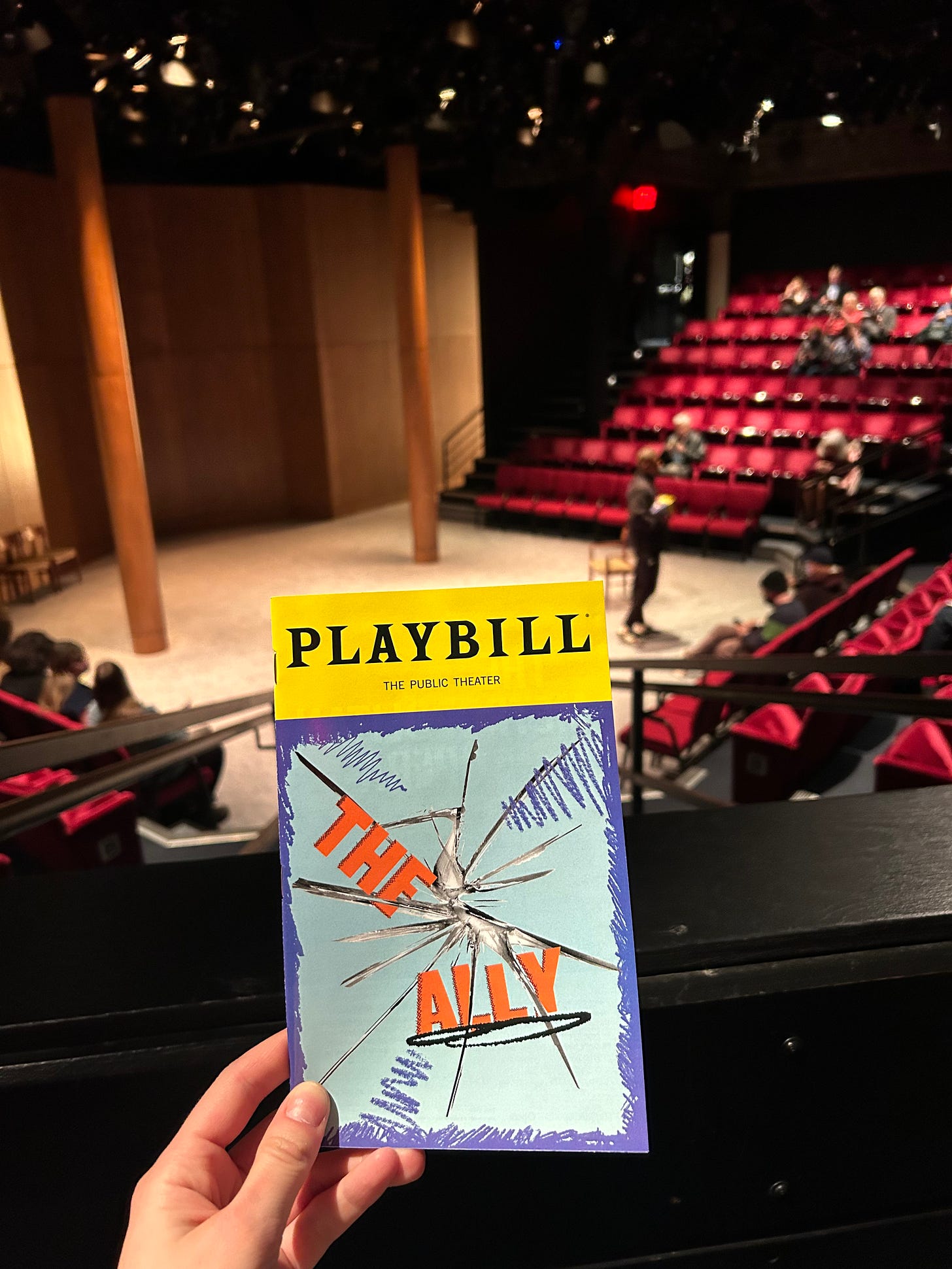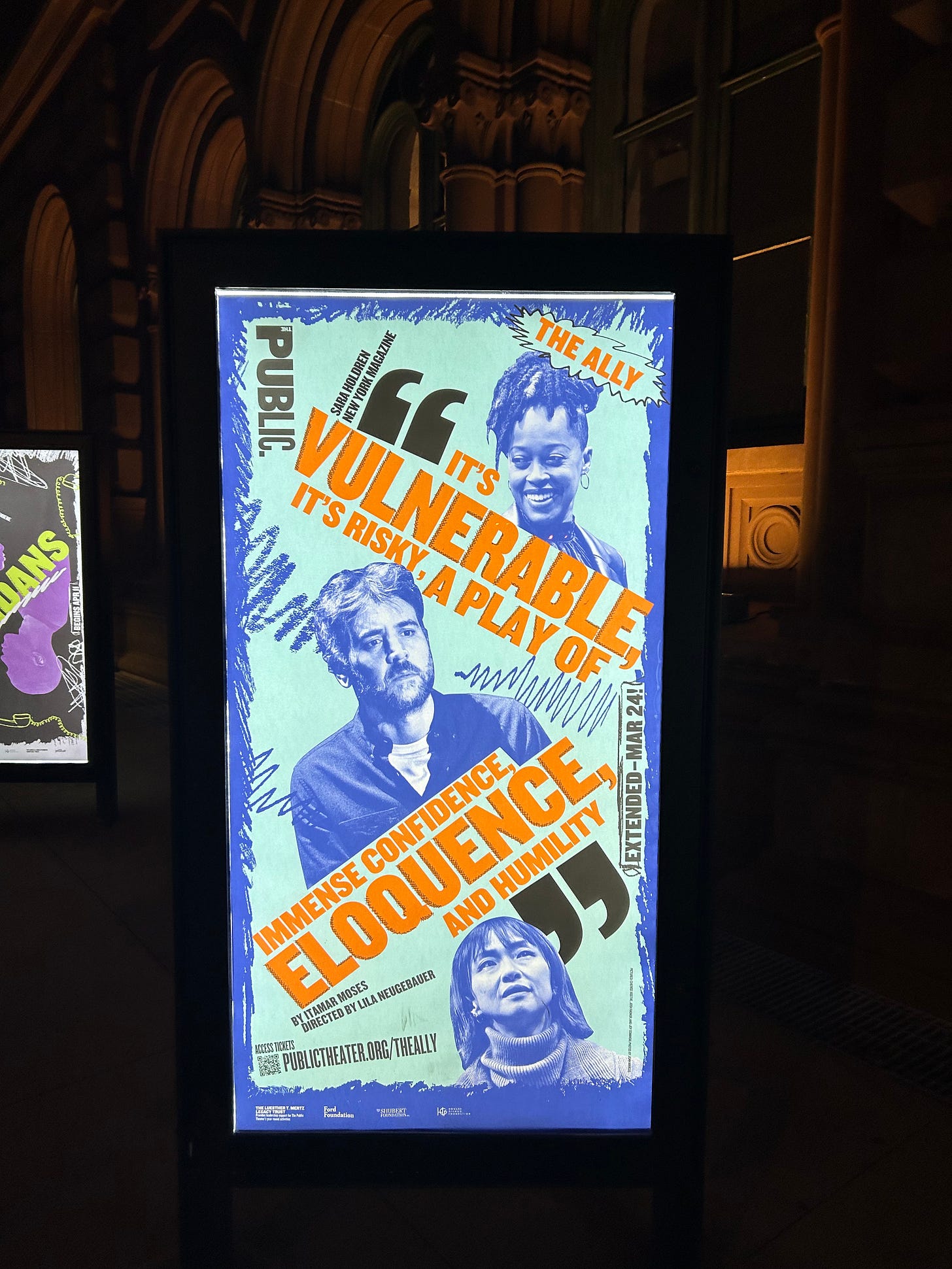Class in Session: Learning Uncomfortable Lessons in “The Ally”
The play about the Israeli-Palestinian conflict that had everyone around me shifting in their seats.
“The Ally” might be set at a university, but it’s not the students who are learning any lessons, it’s the audience.
It’s difficult to settle on a name that would accurately depict this course — because “The Ally” touches on such a wide range of topics that the two and a half hour show could have easily been a four or five hour lecture. While the show’s main focus is the Israeli-Palestinian conflict, it starts seemingly far away from that topic. Yet the play quickly shows us that there may be more connecting these different issues than what meets the eye.
“The Ally” begins in September and early October of 2023 (notably before the Hamas attack on October 7th). Baron (Elijah Jones) approaches his former professor, Asaf (Josh Radnor), and asks him to sign a manifesto for his cousin who was killed by the police. Asaf is deeply saddened and apologetic, immediately condemning the police and visibly distressed about racism — both Baron and his cousin are Black — yet he doesn’t sign the manifesto while Baron is in the room. Instead, he brings it home to his wife, Gwen (Joy Osmanski), a university administrator, and points out one paragraph among the 20 pages. It calls out the “apartheid state of Israel” for its “ongoing genocide of the Palestinian people.”
Asaf is Jewish and Israeli, and while he is liberal and says he does not believe Israel has always done the right thing, he recoils at the phrases “apartheid” and “genocide.” Why use such violent phrases? He wonders. Why single out Israel? Gwen is Asaf’s first of many challengers. This first battle is short and mostly sweet; Gwen argues that the main points of the manifesto are what Asaf undoubtedly believes in, so how much do a few phrases matter, anyway?
Asaf signs it, and the signature quickly becomes what he has likely feared: a representation of a stance against Israel. Other students are quick to notice, specifically representatives from two student organizations: Rachel (Madeline Weinstein), a pro-Palestine Jewish student, and Farid (Michael Khalid Karadsheh), a Palestinian student. They are so excited by Asaf’s views that they want him to help them bring a speaker to campus to talk about Israel.
Of course, this speaker is considered controversial. He challenges Israel’s power and actions, yet these students argue that doesn’t mean he shouldn’t be allowed to speak. Once again, Asaf is hesitant, but their argument boils down to morals he can’t help but agree with. This is about freedom of speech, challenging perspectives, learning different opinions. He agrees to support them.
From there, the play moves from these smaller, more easily won debates to larger, lengthy discussions, mixing academia and ideas with character relationships and personal anecdotes.
Everyone speaks, but not everyone gets the same airtime, or the same depth. I particularly felt short-changed by the half-worked characters of Gwen and Reuven (Ben Rosenfield), a Jewish student who approaches Asaf in private and urges him not to join forces with Rachel and Farid. Both of these characters only ever speak with Asaf, and their conversations feel more like we’re hitting against a backboard — one-sided and repetitive. Gwen has a moment to share her conflict about being a university administrator as the school is gentrifying nearby neighborhoods, but her words fall on mostly deaf ears, and are overshadowed by a random personal plot line — her nervousness about her marriage with Asaf. The result diminishes her character and makes her political struggles seem shallow and secondary.
Reuven, the Jewish, pro-Israel student, only gets one scene where he passionately shares his fears about anti-semitism. His words are siloed in the walls of Asaf’s office; Asaf tries to repeat these sentiments to others later in the play, but does so unsuccessfully. They don’t have the same weight.
The play’s strongest debate is not any one on one conversation, but rather a five-sided epic that brings multiple characters together: Asaf, Rachel, Farid, Baron, and Nakia (Cherise Boothe), a Black community organizer who helped Baron with the manifesto, who also happens to be Asaf’s ex. By putting together both of the play’s initial struggles, we’re encouraged to connect the dots: how are struggles of oppressed people similar across different cultures? Is all oppression connected? Who gets help against injustice? Is it all the same fight?
The most moving moment of this discussion is Farid’s monologue, a breaking point after he spends much of the earlier points of the show in silence. His speech is a blend of personal and political; he recounts the history of the Israeli-Palestinian conflict while interspersing details from his life in Gaza, before he moved for university in the United States. As I imagine for much of the audience, this was the first time I had heard about Palestinian struggles directly from a Palestinian actor on stage.
That’s what “The Ally” does best; it gives voice to the most pressing issues and the people that are rallying around them. By putting these issues into conversation in a theater, it makes use of the medium by forcing an audience to listen. Even if we don’t relate to any of the characters, we’re immersed in the show’s world because it is our world — quite literally, as the stage spills into the audience, and house lighting remains on for much of the show. There is no barrier between us and the actors. We are implicated and forced to recognize our role in what’s being discussed on stage.
So even as I can probe at where “The Ally” falters, specifically in some of the character development, there is no denying: this is a necessary piece of theater. This is a show that starts conversations. It masters talking about the moment without being in this exact one.
“The Ally” is a lesson in how to be uncomfortable, to be challenged, to listen to others even if you disagree. Its job isn’t to change your mind, it’s to open it.
Thank you for reading! “The Ally” plays at The Public through this weekend. Here’s a little more about how I ended up seeing the show:
How I found out about it: My favorite type of marketing: in a Playbill. I saw an article about the show when I went to see “Days of Wine and Roses” with Josh Radnor front and center.
Why I went: I’ve recently been moved by plays that try to talk about current issues — thinking here of “Prayer for a French Republic.” Theater is a unique medium because the live performance brings audiences into the equation, yet we’re expected to listen, not respond. I was curious to see how this show would use that to its advantage.
How I got tickets: The boring, regular way, aka The Public Theater’s website. I believe tickets were capped at around $70.
Stay tuned for a busy April — “Lempicka,” “Doubt,” “Teeth” (yes, again), “Enemy of the People,” “Oh, Mary!”, and “Hadestown” (yes, again, for the ninth time) are on my calendar.
And if you’re interested in seeing one of Broadway’s many new shows this season, the Telecharge lottery has tons of lotteries open every day! I’m entering for “The Outsiders,” “The Notebook,” “Uncle Vanya,” “Hell’s Kitchen,” “Water for Elephants,” and “Suffs.”





Loved this one Zoe!!
Fantastic